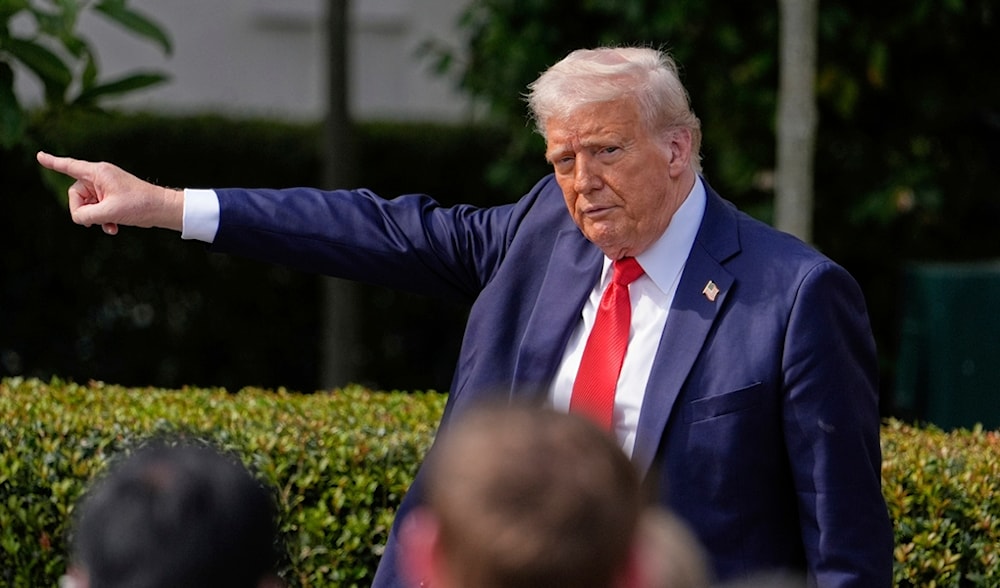US eyes massive cuts to diplomatic programs, embassies worldwide
The plan would close 10 embassies and 17 consulates, including missions in countries such as Eritrea, Luxembourg, South Sudan, and Malta, as well as several consulates in France, Germany, Scotland, and Italy.
-

President Donald Trump gestures to the crowd as he departs after welcoming the 2025 College Football National Champions, the Ohio State University football team, during an event in the White House, April 14, 2025, in Washington. (AP)
The US State Department is reportedly considering a dramatic reduction in its global diplomatic presence, aiming to slash its budget by nearly 50 percent, according to multiple media outlets.
The proposed cuts, detailed in an internal memo dated April 10, would reduce the department’s budget to $28.4 billion for the fiscal year 2026, down from $54.4 billion in 2025.
The plan would close 10 embassies and 17 consulates, including missions in countries such as Eritrea, Luxembourg, South Sudan, and Malta, as well as several consulates in France, Germany, Scotland, and Italy.
In Canada, the consulates in Montreal and Halifax would be significantly downsized to provide what the memo calls “‘last-mile’ diplomacy with minimal local support,” according to Punchbowl News.
Funding would also be eliminated for nearly all international organizations, including the United Nations and NATO, and drastically reduced for global peacekeeping operations.
Programs supporting global health, maternal care, and disease prevention would also face elimination, while the Fulbright Program and other educational and cultural exchanges are set to lose funding.
The move aligns with President Donald Trump’s broader push to cut government spending and scale back US involvement in international affairs. However, critics have called the plan dangerous.
The American Foreign Service Association warned the cuts are “reckless and dangerous,” while former US Ambassador to Russia Michael McFaul called the proposal a “giant gift to the Communist Party of China.”
The memo also assumes that USAID, the US government’s main international development agency, targeted for closure under Trump and billionaire Elon Musk, will be fully absorbed into the State Department, according to The Washington Post.
Though Secretary of State Marco Rubio has not publicly endorsed the memo, his approval would be required before the proposal can move forward. Ultimately, the Republican-controlled Congress, which will need Democratic support to pass the 2026 budget, holds the final authority on any funding decisions.
While the State Department has yet to issue a formal statement, the proposed cuts are expected to be a major point of contention in upcoming budget negotiations.
Trump cuts military presence too
This also comes as the United States debates reducing its military forces across Europe.
While the US has long played a central role in Europe’s defense, officials now argue that maintaining such a large presence is no longer sustainable, particularly as military planners shift attention to a potential conflict in the Indo-Pacific. Assets such as missile defense systems and aircraft currently based in Europe could be redeployed to counter China.
The outcome could significantly reduce America’s military footprint on the continent, marking a sharp shift from decades of transatlantic defense cooperation.
The review, known as a "posture review", is being driven by several key factors: a push to cut federal spending, a growing strategic focus on China, and an interest in improving relations with Russia.
The administration has also expressed frustration with what it sees as an overreliance on the US by NATO allies. “Our European friends must play a bigger role in the future of this continent,” Vice President JD Vance said in February at the Munich Security Conference.
Defense experts warn that reducing US forces too quickly could embolden Russia, weaken NATO, and raise doubts about US commitments globally, especially in the eyes of China. They also note that Europe remains America’s largest trading partner, and a stable continent is vital to US economic and security interests.
Any drawdown, analysts say, should be carefully tailored to meet strategic goals rather than executed hastily. A balanced approach could allow the US to bolster its Indo-Pacific posture without jeopardizing long-standing alliances in Europe.
Read more: Xi Jinping warns protectionism 'leads nowhere' during Vietnam visit

 4 Min Read
4 Min Read










